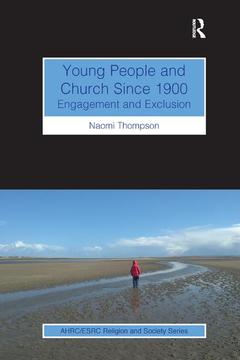Description
Young People and Church Since 1900
Engagement and Exclusion
AHRC/ESRC Religion and Society Series
Author: Thompson Naomi
Language: English
Subject for Young People and Church Since 1900:
Keywords
Young Men; UK Church; christian; UK Movement; youth; Christian Youth Work; work; East Midlands Oral History Archive; sunday; Youth Work; schools; Sunday School Decline; workers; Youth Work Programme; school; Moralistic Therapeutic Deism; Sunday Schools; wider; Religious Open Market; social; Vicarious Affiliation; Open Access Youth; Vicarious Religion; Christian Youth Activities; Young People’s Engagement; Sunday School Movement; Birmingham Union; Christian Nurture; UK Research; Scripture Exams; Fowler’s Model; Sunday School Attendance; Barna Group; Adult Church
Publication date: 12-2019
· 15.6x23.4 cm · Paperback
Publication date: 08-2017
· 15.6x23.4 cm · Hardback
Description
/li>Contents
/li>Biography
/li>
When the Sunday School pioneers saw a need in their communities in the late eighteenth century, their response provoked a 200 year movement. These early Sunday Schools met a clear social need: that for basic education. By the 1960s, they faced rapid decline ? a rigid institution amidst societal change.
Over recent decades, Christian youth work has emerged as a response to further youth decline within churches. Many youth workers engage with young people?s self-perceived needs by delivering open-access youth provision in their local communities alongside more specifically Christian activities. Tensions emerge over whether the youth worker?s role is to serve community or church needs, with churches often emphasising the desire to see young people in services.
Drawing together historical and contemporary research, Young People and Church Since 1900 identifies patterns and change in young people?s engagement with organised Christianity across time. Through this, it provides a unique analysis of the engagement and exclusion of young people in three key time periods, 1900?1910, 1955?1972, and the present day. Whilst much commentary on religious decline has focused on changes external to churches, this text draws out the internal decisions and processes that have affected the longevity of Christianity in England. This book will be of interest to researchers and scholars of young people and Christianity in the twentieth century and today, as well as youth ministry students and practitioners and those interested in youth decline in churches more widely.
1 Introduction: Postmodernism, Institutionalisation and Social Currencies
2 From Raikes’ Revolution to Rigid Institution: Sunday Schools in Twentieth-century England
3 Sunday Schooling in Birmingham and Beyond: Qualitative findings from the historical study
4 From Sunday Schools to Christian Youth Work: young people and Christianity in twenty-first century Birmingham
5 Christian youth work: social, spiritual and institutional agendas
6 An American Example: Youth Worker Narratives of Young People and Christianity in Minnesota
7 Conclusions




